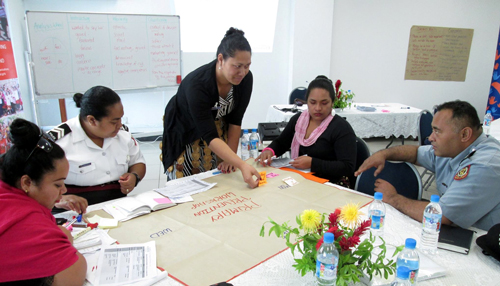Ms 'Ofa Guttenbeil-Likiliki may have one of the toughest jobs in Tonga. The Director of the Women and Children Crisis Centre (WCCC) Tonga, and her staff, deal with cases of domestic violence, rape, incest and other forms of sexual and physical abuse involving women and children, on a daily basis. As the Centre turns six in 2015, Ms Guttenbeil-Likiliki reflects on some of the challenges and triumphs of half a decade's work.
With 3 out of 4 women and girls in Tonga experiencing physical or sexual violence over their lifetime, the Australian Government is ensuring supporting survivors of violence in Tonga have access the services they need. Through the Australian aid program, the Pacific Women Shaping Pacific Development program (Pacific Women) is supporting the Women and Children Crisis Centre (WCCC) Tonga over three years.
The Centre was founded in 2009 to advocate for women's and children's human rights based on the lived realities of Tongan women, girls and children who have experienced and survived all forms of violence. Over the years, important relationships have been forged and strengthened with key agencies such as the police, Ministries of Education, Health and court staff with the understanding that the Centre was part of the national effort to eliminate violence against women and children.
Since its inception, Ms Guttenbeil-Likiliki cannot remember a single woman or child ever reporting a case of violence or abuse immediately after it happened.
'The fact that she has chosen to walk through our doors or has contacted us whether by telephone or social media means she is at a crisis point. Most of the time, we are the very last people or organisation she would come to because she's reached that crisis point. Women can be victims of violence from the first day of the relationship and put up with it for up to 30 years. It is typically those who have been abused over and over again who finally make the decision to seek help'.
For Ms Guttenbeil-Likiliki, it is about being true to the woman or child who has chosen to share their story and seek help.
'I'm very aware there are people who absolutely hate it when I open my mouth; and there are people who are very thankful because they learn from our advocacy – it's like a complete breakthrough,' shared Ms Guttenbeil-Likiliki.
More information
- DFAT supports 16 Days of Activism Against Gender-Based Violence 25 November – 10 December 2015
- Pacific Women Shaping Pacific Development
- Overview of Australia's aid program to Tonga

